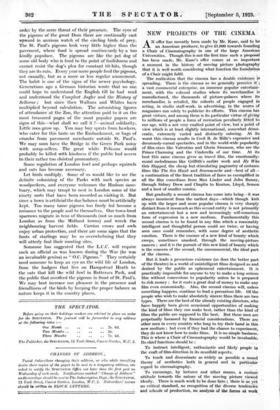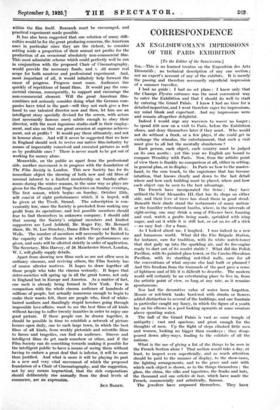NEW PROJECTS OF TJ-IE CINEMA
AN offer has recently been made by Mr. Kane, said to be an American producer, to give £1,000 towards founding a Chair of Cinematography in one of the large American Universities. Though this is not the first time such a nroposal .has been made, Mr. Kane's offer comes at so important a moment in the history of moving picture photography
thatit is well worth considering what function the foundation . , of a Chair might fulfil. • The realization that the cinema has a double existence is
spreading. There is the cinema as we generally perceive if ; a vast commercial enterprise, an immense popular entertain- ment, with the colossal studios where its merchandise is manufactured, the thousands of picture-palaces where its merchandise_ is retailed, the cohorts of people engaged in acting, in studio staff-work, in advertising, in the scores of
magazines run solely to publicize its efforts. This cinema his great virtues, and among them is its particular virtue of giving to millions of people a form of recreation peculiarly fitted to our age, with a not very exalted point of view, but a'point of view which is at least slightly international, somewhat demo- cratic, extremely varied and distinctly calming. At its worst this cinema results in -Cecil B. de Mille's expensive , and decorously,carnal spectacles, and in the world-wide popularity of film-stars like. Valentino and Gloria Swanson, who are the Prince Charming and the Cinderella of our time. At its best this same cinema gives us travel film, the emotionally-
moral melodramas like Griffith's earlier work and He Who Gets Slapped, the cheap but stimulnting pageantry of costume films like The Sea Hawk and Scaramuche and—best of all- ' a continuation of the finest tradition of farce as exemplified in all the film comedians from Max Linder and John Bunny,
through Sidney Drew and Chaplin to Keaton, Lloyd, Semon and a host of smaller comics.
But gradually a second cinema has come into being—it was always imminent from the earliest days—which though knit up with the larger and more popular cinema is very sharply distinct from it inasmuch as this second entity is not primarily an entertainment but a new and increasingly self-conscious form of expression in a new medium. Fundamentally this second cinema is to be found in any film which a reasonably 'intelligent and thoughtful person could see twice, or having seen once could remember, with some degree of aesthetic emotion. There is the essence of a new kind of beauty which creeps, sometimes unasked, through the moving-picture camera ; and it is the pursuit- of this new kind of beauty which is the concern of the second, the uncommercial, the ideal part of the cinema.
. But it leads a precarious existence (as does the better part of the theatre) in a world of unintelligent films designed as and desired by the public as ephemeral entertainment. It is practically impossible for anyone to try to make a long serious film without concessions to popularity unless he is prepared to risk money ; for it costs a great deal of money to make any film even economically. Also, the second cinema will, unless something happens, continue to lead a precarious life. Of. the people who wish to make absolutely sincere films there are two types. There are the best of the already existing directors, who have happily been given occasional opportunities of making the kind of films they can make best, rather than the kind of films the public are supposed to like best. But these men are perpetually -harassed by financial considerations. There are
other men in every country who long to try their hand in this new medium : but even if they had the chance to experiment, they do not know how to make films. It is no simple business. This is where a Chair of Cinematography would be invaluable. Its chief functions should be :
To instruct intelligent, enthusiastic and likely people in the craft of film-direction in its manifold aspects.
To teach and disseminate as widely as possible a sound theory of aesthetics both in general and in particular regard to cinematography.
To encourage, by lectures and other means, a curious attitude towards the nature of the moving picture viewed ideally. There is much work to be done here ; there is as yet no critical standard, no recognition of the diverse tendencies and schools of production, no analysis of the forces at work
within the film itself. Research must be encouraged, and practical experiment made possible.
It has also been suggested that one solution of many diffi- culties would be for the great producing concerns, the American ones in particular since they are the richest, to consider setting aside a proportion of their annual net profits for the production of an occasional absolutely non-commercial film. Thii.most admirable scheme which could perfectly well be run in conjunction with the proposed Chair of Cinematography, would provide the. necessary funds, and a aid assure real scope for both amateur and professional experiment. And, most important of all, it would infinitely help forward the cause of progress. Progress must come. Audiences tire quickly of repetitions of banal films. It would pay the com- mercial cinema, consequently, to support and encourage the non-commercial element. Will the great American film- combines not seriously consider doing what the German com- panies have tried in the past—will they not each give a free hand to one talented director now and then, let him use an intelligent story specially devised for the screen, with actors (not necessarily famous ones) subtle enough to obey their director, with the most ingenious studio-staff in their employ- ment, and aim on that one great occasion at'supreme achieve- ment, not at profits ? It would pay them ultimately, and not in honour alone. And will it never be suggested that we here, in England should seek to revive our native film-industry by means of impeccably conceived and executed pictures as well as by profitable ones ? There is never much to be got out of working for money alone.
Meanwhile, on. the public as apart from the professional side, another movement is in progress with the foundation of The Film Society in London. This new Society has for its ' immediate object the showing of both new and old films of unusual interest to a limited membership on Sunday after- noons during the winter seasons, in the same way as plays are given for the Phoenix and Stage Societies on Sunday evenings. The first season, which begins on Sunday, October 25th, will consist of eight performances which, 'it is hoped, will be given at the Tivoli, Strand. The subscription 'is con- veniently low,' since the Society is precluded from making any profit froth its operations, and -lest possible members should fear to find themselves in unknown company, I should add ' that among the society's original Members and kindest supporters are Lord Ashfield, Mr: Roger Fry, Mr. Bernard Sluice, Mr. St. Loe Strachey, Daine Ellen Terry and Mr. H. G. Wells.' The number of members will necessarily be limited to the' capacity of the theatre in which the perforinances are' given, and seats will he allotted strictly in order of application. • The Secretary, Migs Harvey, of 56 Manchester Street, London, W. 1, will gladly supply details.
Apart from showing new films such as are not often seen in ordinary cinemas, and reviving others, the Film Society has of course ulterior motives. It hopes to draw together all those -people who take the cinema seriously. It hopes that sister-societies will spring up in all the great towns, not only in England but in Europe and America. As a matter of fact, one such is already being formed in New York.' Few in comparison with the whole cinema audience of hundreds of millions of people, but actually numerous enough to begin to make their wants felt, there are people who, tired of white- haired mothers and dazzlingly stupid heroines going through impossible love-affairs, want to see the best films of all kinds without having to suffer twenty inanities in order to enjoy one good picture. If these people can be drawn together, it should be possible in time to establish a network of picture - houses.open daily, one to each large town, in which the best • films of all kinds, from weekly pictorials and scientific films to farces and tragedies, can fmd an audience. Sincere and intelligent films do get made somehow or other, and if the Film Society can do something towards making it possible for the intelligent public to have a means of seeing them without having to endure a great deal that is inferior, it will be more than justified. And what is more it will be playing its part in a new and very vital movement of which the proposed foundation of a Chair of Cinematography, and the suggestion, not by any means impractical, that the rich corporations should deliberately rise annually from the dead levels of commerce, are an expression.
IRIS BARRY.











































 Previous page
Previous page